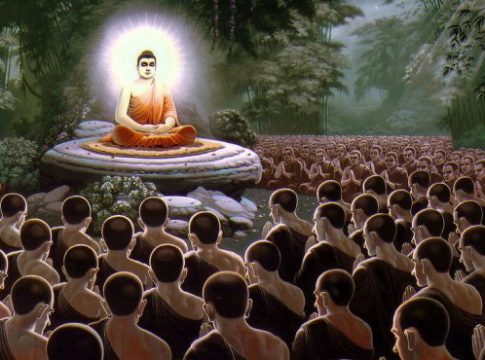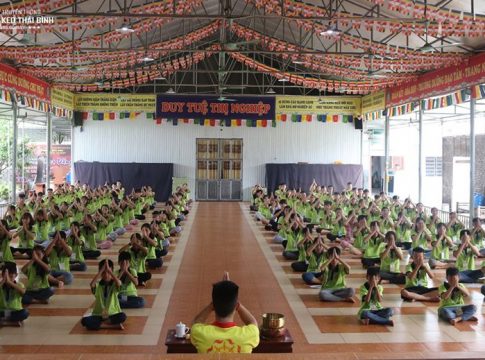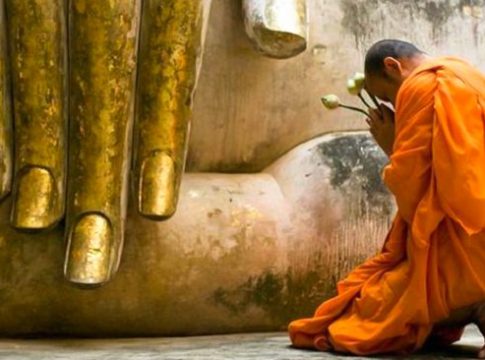A Story of the Power of Compassion
By Tam Hoa — 12/11/2019
When the king and his soldiers came to arrest Angulimala, they found him residing in the Buddha’s monastery. Upon learning that Angulimala had renounced his evil ways and become a monk, the king and his retinue agreed to leave him in peace. From that point forward, Angulimala diligently practiced meditation.
Long ago, during the reign of King Pasenadi of the Kosala kingdom, there lived a young man named Ahimsaka, the son of a Brahmin (the highest caste of priests in India). He was sent to the city of Taxila to pursue his studies. Ahimsaka was intelligent and obedient, earning the affection of both his teacher and the teacher’s wife. This drew the jealousy of his fellow students, who slandered him by falsely accusing him of having an improper relationship with the teacher’s wife. At first, the teacher did not believe them. However, after hearing the accusation repeatedly, he grew convinced and swore to take revenge.
Unwilling to directly kill his student, which would have damaged his reputation, the teacher devised a dreadful plan. He told Ahimsaka to kill 1,000 people and collect a thumb from each victim as payment for the education he had received. Though horrified by the request, Ahimsaka was driven away from the teacher’s home and returned to his parents.
Despite being innately kind and intelligent, Ahimsaka was deceived by the jealousy and malice of his teacher, who manipulated him into believing that he must gather 1,000 little fingers to continue his spiritual training. Misguided and desperate, Ahimsaka became Angulimala—one of the most feared bandits of the time.
When his father learned why Ahimsaka had been expelled, he was furious and refused to listen to any explanation. On that very day, during a torrential storm, the father ordered his son to leave the house. Ahimsaka then ran to his mother for advice, but she was powerless to oppose her husband’s decision. He sought help from his fiancée’s family, but they too rejected him after hearing of the expulsion. Humiliated, enraged, terrified, and hopeless, Ahimsaka went mad. In his anguish, he recalled the teacher’s cruel command—to collect 1,000 fingers—and began his killing spree. At first, he hung the fingers from tree branches, but when crows and hawks began to take them, he strung them into a garland around his neck to keep count. Thus, he became known as Angulimala—“the one who wears a garland of fingers.”
His reign of terror spread fear across the countryside. The king himself heard of Angulimala’s atrocities and ordered his arrest. Meanwhile, Angulimala’s mother, Lady Mantani, upon hearing of the king’s intent, ventured into the forest, hoping to save her son from destruction. At that time, Angulimala was just one finger away from completing his gruesome tally.
The Buddha, in His boundless compassion, perceived the mother’s desperate attempt and foresaw that if He did not intervene, Angulimala would encounter his mother next—and in seeking his final finger, might kill her. Such an act would result in even greater suffering and heavier karmic consequences for him. Motivated by compassion, the Blessed One entered the forest.
Exhausted and sleepless for days, Angulimala was frantic to claim one final victim. Looking down from his hideout, he saw a lone woman walking along the path—it was his mother. Intent on completing his vow, he began to move toward her. At that moment, the Buddha appeared, walking calmly ahead. Determined to substitute this wandering monk for his mother, Angulimala raised his sword and chased after the Blessed One. However, though the Buddha continued walking at a normal pace, Angulimala could not catch up.
Frustrated, he cried out, “Stop, monk! Stop!”
The Buddha replied, “I have already stopped, Angulimala. It is you who have not stopped.”
Angulimala, confused, asked, “What do you mean? You are walking and yet say you have stopped. I am the one standing still, and you say I have not stopped?”
The Buddha explained, “I have stopped because I have renounced harming all beings. I have abandoned violence and dwell in compassion, forbearance, and wisdom through contemplation. But you have not stopped—you continue to kill and harm others, and have yet to abide in loving-kindness and patience.”
Hearing these words, Angulimala was struck with realization. These were the words of a sage—fearless, gentle, and wise. Surely, this monk must be the Enlightened One. He must have come for the sole purpose of guiding me to the light. With that thought, Angulimala threw away his weapons and prostrated himself, begging the Buddha to ordain him as a monk. The Buddha accepted.
When the king and his army came to apprehend Angulimala, they found him peacefully residing in the Buddha’s monastery. Upon hearing that he had renounced evil and become a monk, they left him unharmed. Angulimala continued to devote himself wholeheartedly to meditation.
Angulimāla aspired to be like a lotus that rises above the muddy water to bloom with fragrance.
Yet even in his monastic life, Angulimala was not free from inner torment. While meditating, he was often haunted by the cries and agony of his victims. As a karmic consequence of his past misdeeds, townspeople would often hurl sticks and stones at him when he went on alms rounds. He would return to the monastery bloodied and bruised. The Buddha would gently remind him:
“Dear son Angulimala, you have already abandoned evil—endure patiently. This suffering is the fruit of your past karma. Had I not met you and guided you, this karma would have caused you to suffer for countless lifetimes.”
One morning in the city of Savatthi, while going for alms, Angulimala heard the anguished cries of a woman in labor. Upon learning she was struggling with childbirth, he was moved by deep compassion. He reported this to the Buddha, who instructed him to recite a truth-statement, which later became known as the Angulimala Paritta (Protective Chant of Angulimala).
Approaching the woman behind a curtain, he declared:
“Since the day I attained arahantship, I have not intentionally harmed any living being. By this truth, may you and your unborn child be well and safe.”
Immediately, the woman gave birth with ease, and both mother and child were healthy. To this day, many still use the Angulimala Paritta as a sacred protective chant.
Venerable Angulimala chose to live in solitude and eventually passed away peacefully. Having attained arahantship, he entered Parinibbāna—final liberation without remainder.
When the monks asked the Buddha where Angulimala had been reborn, the Blessed One replied that he had attained Parinibbāna. Some were skeptical: “Can one who committed such grave evil truly reach Nibbāna without remainder?”
To this, the Buddha answered:
“Monks, though Angulimala committed great evil, it was because he had no guidance. Later, he met noble friends, received wise counsel, and dedicated himself with unwavering determination to the Dhamma and the practice of meditation. Thus, his wholesome actions overcame his past evil, and he completely eradicated all defilements.”
The Buddha further praised him with a verse:
Who once was heedless,
but later is not,
brightens the world
like the moon set free from a cloud.
The power of compassion always surpasses any evil karma.
And it is through compassion that enlightenment becomes possible.
!["[KTMH] Trailer | WHAT TO DO TO MAKE SUMMER HOLIDAYS MORE MEANINGFUL?"](https://i3.ytimg.com/vi/s0VUGa1v6uw/maxresdefault.jpg)
.jpg)


